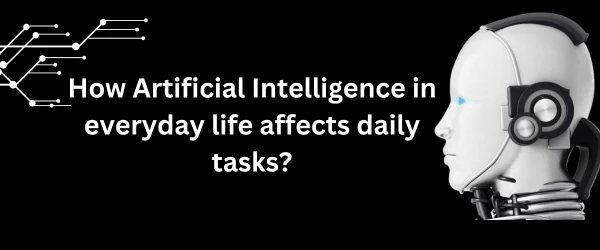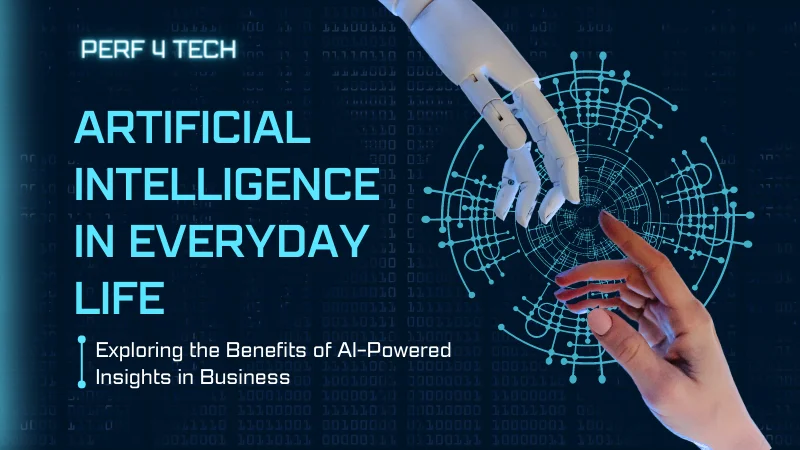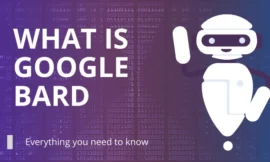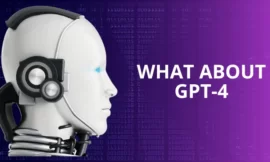Artificial intelligence (AI) has made a remarkable impact on our daily lives, from self-driving cars to voice-powered personal assistants. Over the past few years, the leaps in AI development have been nothing short of astonishing, and its integration into everyday life has become increasingly seamless. In this article, we will explore how Artificial Intelligence in Everyday Life continues to transform the world around us.

Table of Contents
ToggleHow Artificial Intelligence in everyday life affects daily tasks?
Artificial intelligence affects our daily tasks and helps us solve some of the problems we face. We can find artificial intelligence in some of these classifications and categories and they are as follows:
- Virtual assistance
- Social media
- Online shopping and stores
- Navigations
- improve cybersecurity
- Health care
- Entertainment
- Financial services
- Chabot’s
- Smart cities
- Educations
I will explain in detail about them and how they affect so let’s continue…
1. Virtual Assistants and Smart Home Devices
One of the most well-known applications of AI in everyday life is through virtual assistants like Apple’s Siri, Amazon’s Alexa, and Google Assistant. These voice-activated systems are designed to understand natural language and perform various tasks, from answering questions and setting reminders to controlling smart home devices. The AI technology behind these assistants is continually evolving, making them more accurate and user-friendly over time.
2. Social Media and Content Recommendations
AI is also a driving force behind the content we consume on social media platforms. Algorithms analyze user data and preferences to curate personalized news feeds, suggest new connections, and recommend relevant content. This technology has revolutionized the way we discover and interact with information online, creating more engaging and targeted experiences for users.
3. Online Shopping and Personalization
AI has transformed the online shopping experience by leveraging user data to recommend products tailored to individual preferences. Machine learning algorithms analyze browsing history, past purchases, and other factors to suggest products that are most likely to appeal to each user. This personalization extends to targeted advertising, customer support, and even dynamic pricing.
4. Navigation and Maps
Traveling and commuting have become much more efficient thanks to AI-powered navigation systems. Apps like Google Maps and Waze use AI algorithms to analyze real-time traffic data, predict congestion, and suggest alternative routes, saving users both time and fuel. These systems also consider factors like distance, speed limits, and road closures to provide the most accurate and efficient route possible.
5. Improving Cybersecurity
As our reliance on digital platforms and technology grows, so does the need for robust cybersecurity measures. AI plays a crucial role in detecting and preventing cyber threats in real time. AI-powered systems can respond rapidly to cyberattacks, mitigating risks and protecting sensitive information. With the ever-evolving nature of cyber threats, AI is an indispensable tool in safeguarding our digital world.
6. Healthcare Innovations
AI is revolutionizing healthcare by improving diagnostics, treatment plans, and patient monitoring. Machine learning algorithms are capable of analyzing vast amounts of medical data to identify patterns and trends, leading to more accurate diagnoses and better-informed treatment decisions. Additionally, AI-powered wearables and health apps can monitor vital signs, provide reminders, and even alert healthcare providers to potential issues.
7. Enhanced Entertainment Experiences
From video streaming platforms to music services, AI is changing the way we consume entertainment. Intelligent algorithms analyze user preferences, viewing habits, and even mood to recommend content that is most likely to resonate. This has led to more personalized and engaging entertainment experiences across various platforms.
Artificial intelligence has undoubtedly become an essential part of our daily lives, touching nearly every aspect of our routines. As AI technology continues to advance, we can expect even more innovative applications and exciting possibilities in the future.
8. Financial Services and Fraud Detection
AI has also made significant contributions to the financial services sector. By using complex algorithms and machine learning, AI systems can analyze financial transactions and market trends, enabling institutions to make better investment decisions. Additionally, these systems are instrumental in detecting and preventing fraud by identifying suspicious patterns and unusual activities, ensuring the security of customers’ assets.
9. Customer Support and Chatbots
Customer service has seen a significant shift with the introduction of AI-driven chatbots. These virtual assistants help businesses provide instant support to customers, answering queries, troubleshooting issues, and even guiding users through the purchasing process. As AI technology improves, chatbots are becoming increasingly adept at understanding natural language and context, resulting in a more human-like interaction with customers.
10. language model chatbots
We also know that artificial intelligence has contributed to the development of our daily tasks and solving the problems we face. Among the miracles of artificial intelligence are chatbots that appeared recently as Chatgbt 3.5 and GBT-4 also we talk about Google Bard and even Microsoft Bing Chatgbt. I have explained in separate articles about these bots. You can read just by pressing the links.
11. Smart Cities and Infrastructure
Artificial intelligence plays a crucial role in the development and operation of smart cities. From traffic management and waste disposal to public safety and energy management, AI systems can analyze vast amounts of data to optimize urban processes and improve the overall quality of life for residents. AI-powered surveillance systems, for example, can monitor public areas for potential security threats, while predictive maintenance technologies can identify infrastructure issues before they become critical.
12. Education and Personalized Learning
AI is transforming the education sector by enabling personalized learning experiences for students. By analyzing individual students’ progress, strengths, and weaknesses, AI-powered educational platforms can tailor content and learning paths to suit each student’s needs. This adaptive approach to learning helps students grasp complex concepts more effectively and enables educators to provide targeted support where needed.
conclusion
In conclusion, artificial intelligence has become an integral part of our daily lives, with its influence extending across various industries and aspects of society. As AI technology continues to evolve and mature, we can expect even more groundbreaking applications and improvements in the way we live, work, and interact with the world around us.
Finally, I hope my article added some valuable information to you. If you have some questions? Let me know in the comments below. I’ll try my best to answer them.




